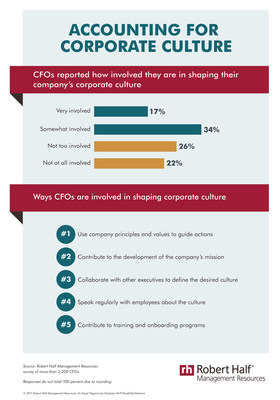Press Releases
Read about our latest research, including results from our ongoing surveys of senior managers and workers, and company announcements.
MENLO PARK, Calif., Aug. 16, 2017 -- Beyond managing their company's finance function, many CFOs also feel accountable for a less tangible aspect of the business: its corporate culture. In a Robert Half Management Resources survey, 51 percent of CFOs said they play at least some role in shaping corporate culture. Executives reported taking several steps, including using their firm's values to guide their actions and helping develop the organization's mission and define the desired environment.
CFOs were asked, "How involved are you in shaping your company's corporate culture?" Their responses*:
|
Very involved |
17% |
|
Somewhat involved |
34% |
|
Not too involved |
26% |
|
Not at all involved |
22% |
|
99% |
|
* Responses do not total 100 percent due to rounding. |
CFOs who reported being somewhat or very involved also were asked, "How are you involved in shaping your company's corporate culture?" Their responses**:
|
Use company principles and values to guide actions |
83% |
|
Contribute to the development of the company's mission |
79% |
|
Collaborate with other executives to define the desired culture |
78% |
|
Speak regularly with employees about the culture |
76% |
|
Contribute to training and onboarding programs |
72% |
|
** Multiple responses permitted |
View an infographic of the research.
"CFOs enjoy vast influence throughout their organizations – more than many people probably realize," said Tim Hird, executive director of Robert Half Management Resources. "Proper financial reporting and management set a model for the firm's business, ethics and corporate culture."
Hird added that experience developing and aligning employees with the company's mission and values can help prepare CFOs for a CEO role. "Financial executives looking to advance must go beyond leading the finance function and show an ability to foster a positive corporate culture. Start by setting the right example and grow your involvement from there, including working with employees to define what is best for the firm."
Robert Half Management Resources offers additional tips to help executives build a strong corporate culture:
- Tell employees why their work matters. Make sure you or management talk to staff about how they contribute to the company's success. People want to know how they make a difference, which will help them stay focused on your firm's key objectives.
- Say "thank you." Foster a culture of appreciation, where people see their work is recognized. In the process, you'll reinforce the level of expected performance.
- Give people tools to advance. Invest in training and develop career paths, including identifying specific support the company can offer to help employees meet their individual and team goals.
- Keep staff updated on financial performance. Employees are interested in hearing how your firm is doing. Leaving them in the dark can lead to stress, disengagement and speculation.
- Turn jobs into careers. People want to enjoy where they work. Show them how they can succeed at your organization, and conduct team-building activities that allow colleagues to develop stronger ties.
About the Research
The survey was developed by Robert Half Management Resources and conducted by an independent research firm. It is based on telephone interviews with more than 2,200 CFOs from a stratified random sample of companies in more than 20 of the largest U.S. metropolitan areas.
About Robert Half Management Resources
Robert Half Management Resources is the premier provider of senior-level finance, accounting and business systems professionals to supplement companies' project and interim staffing needs. The company has more than 140 locations worldwide and offers assistance to business leaders and consultants at roberthalf.com/management-resources and on its blog at roberthalf.com/management-resources/blog.
SOURCE Robert Half Management Resources
